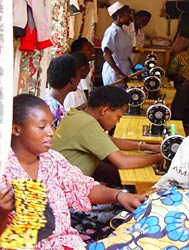Somebody must have won
War in the twentieth century has provided the catalyst in many Western societies for women to 'liberate' themselves from inequalities of opportunity and traditional attitudes towards women.
But throughout history women have found themselves caught up in the battle zone, facing the destruction of their homes and suffering from looting, reprisal killings and rape. Women and children have suffered as refugees and displaced persons, having to rebuild their lives in alien cultures. The peace movements in many countries have turned to women as the natural supporters of their campaigns.

'Women Can Win' leaflet from 1955, advertising a protest march in Nottingham (Westacott Collection)
In the twenty-first century women, and children, have suffered from being the targets of war through the deliberate use of sexual torture, humiliation and rape, particularly in the civil wars in Eastern Europe, Africa and Afghanistan. Women's aid organisations have been active in establishing practical programmes to help women overcome their physical and psychological sufferings.

Press cutting about a Jacob's Well charity worker who was making her fifth visit to Afghanistan, to deliver emergency supplies (Private collection)
One example is Project Independence - Women Survivors of War - a partnership between Soroptimist International and Women for Women International running a four-year programme of education, training and financial support to help women in Rwanda, Bosnia and Afghanistan to rebuild their lives.
- 80% of all refugees and displaced persons globally are women and children
- 20,000 Bosnian women were raped during the Balkan War between 1992 and 1995
- 500,000 Rwandan women were raped in the 1994 genocide
- One in 6 women under Taliban-controlled Afghanistan tried to commit suicide
Figures supplied by Project Independence

Sewing training (Project Independence)

Female weavers (Project Independence)

Women for Women International's bakery sign (Project Independence)
The [First World] war revolutionised the industrial position of women - it found them serfs and left them free.
Millicent Fawcett, 1918
I and my friends feel that we were trail blazers for the women of today, because we did so many different types of work that before the war had only been done by men, and the ATS had proved to those in high places that we were an asset.
Margaret Waldie, served as a gun layer in the ATS during the Second World War
After the war I put my training in electricity to good use as I then qualified as a Medical Radiographer finding the physics part of the course easier after my naval experience.
Sheila Kent served in the WRNS 1943-1946
New refugees coming to Britain now are in just as much in need of help and a warm welcome as ever, especially when they are often destitute, traumatised and yet not allowed to work.
Reni Chapman, refugee to the United Kingdom after the Second World War
The war took away all my material possessions but I am lucky because my children and my grandchildren are all alive. Now I am returning to life, after these cursed years of war, and I see and feel a warm light from women in the world who have not forgotten us.
Bosnian woman survivor to her Project Independence sponsor
Next: Women supporting the military effort